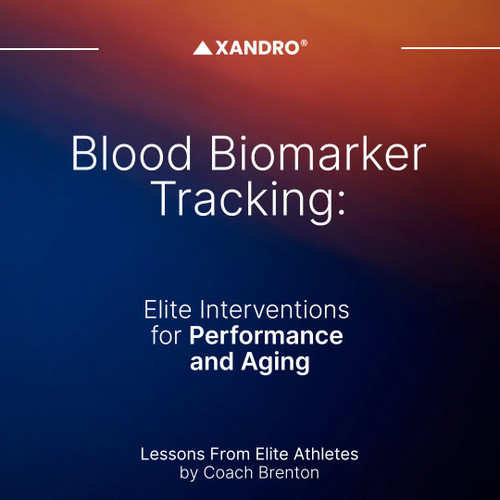Blood Biomarker Tracking: Elite Interventions for Performance and Aging
15th Oct 2025
As a performance coach with over twenty years of experience working with top athletes internationally, I’ve seen how small insights can lead to big changes in performance.
One of the key tools that athletes use is tracking their blood health. Instead of just looking at how much they train, teams analyze detailed lab results to help athletes recover better, avoid injuries, and stay at their best.
Now, this level of detail is available to everyone who wants to improve their health and well-being. By using the same blood tracking techniques that elite athletes rely on, regular people can keep an eye on their health, spot any early signs of problems, and make smart choices to enhance their overall wellness.
This approach not only helps with sports performance but also contributes to living a longer, healthier life.
1. Elite Sports: Precision in Every Drop
Top sports teams keep a close eye on specific health markers to improve training and recovery. They look at indicators like muscle damage, inflammation, and hormone levels to get a complete picture of an athlete's condition. This information helps personalize training plans and ensures athletes don't push themselves too hard.
For instance, after a game, certain markers can indicate how much recovery an athlete needs over the next few days. It’s all about using science, not guesswork, to improve performance.
2. Tracking Aging: Understanding Our Biological Age
New Ways to Measure Age
Recent research shows that the levels of proteins and changes in our DNA can reveal our biological age, which may differ from our actual age. Certain tests that analyze these factors can predict our health and aging more accurately than traditional methods.
Checking Organ Health
A landmark study observed protein patterns in the blood related to various organs, like the brain and heart, to determine how old these organs are biologically. If vital organs are older than they should be, it can lead to a higher risk of serious health issues, including greater chances of death and conditions like Alzheimer’s disease.
Comprehensive Health Insights
A new tool from the University of Washington can estimate how well your body is aging by looking at several health indicators in the blood. By understanding our body's health better, we might avoid high healthcare costs and improve our well-being over the years.
3. Benefits for Everyone
Early Warning Signs
Standard health tests usually check just a handful of markers, which might not give an accurate picture of our health since they're based on averages from a generally unhealthy population. Looking at more than 800 markers can highlight potential health risks long before we start noticing symptoms, such as heart issues or diabetes.
Customized Health Recommendations
Tracking markers related to inflammation (which can contribute to aging and illness) can help people make targeted lifestyle changes, such as adjusting their diet or managing stress.
Simple actions like getting enough sleep and exercising can lead to healthier organ age, and some supplements have also been linked to better health outcomes.
The Power of Monitoring
Understanding our internal health can inspire us to make thoughtful adjustments to our lifestyle. With this kind of information, we can shift our approach from reacting to health issues to proactively managing our well-being.
For example, one entrepreneur who monitored his health markers was able to effectively reduce his biological age by 15 years.
Caution and Responsible Use
While tracking health markers is beneficial, it’s essential to use this information wisely. Experts advise against excessive testing; frequent blood tests without a clear reason can lead to unnecessary worries or medical decisions. The science around these aging markers is still developing, and it’s important to ensure that the data is reliable and applicable to diverse populations.
Framework: Biomarker + Lifestyle Integration
|
Component |
Athlete Model |
Everyday Application |
|
Baseline Tests |
In-season panels (hormones, CK, inflammation) |
Annual comprehensive panel (lipids, glycemic, CRP, liver, kidney, inflammatory, proteomic/epigenetic if available) |
|
Periodic Monitoring |
Weekly or after heavy matches |
Quarterly or post-intervention |
|
Key Interventions |
Adjust training load, sleep, recovery |
Targeted diet, stress management, supplements, metabolic, and longevity coaching |
|
Longitudinal tracking |
Adaptive training via biomarker trends |
Adjust lifestyle based on trends—improve healthspan trajectory |
Final Thoughts
Top athletes have mastered how to perform at their best and recover effectively by using a method called biomarker tracking. Think of biomarkers as a kind of health roadmap that helps them navigate toward better health and peak performance.
This cutting-edge technique allows athletes to keep an eye on important signs of their health, enabling them to adjust their training and recovery plans as needed. We can take inspiration from this approach to help everyday people tackle the challenges of aging.
By adopting biomarker tracking in relation to aging, individuals can gain valuable insights about their health. This proactive approach helps them catch potential problems early, encouraging healthier lifestyle choices and informed medical decisions. In turn, this can lead to a longer life, not just in terms of years, but in being healthy and avoiding illness.
By following the principles of monitoring their health indicators, we can create a future where age is seen not just as a number, but as an informed choice that can enhance our quality of life and longevity.
